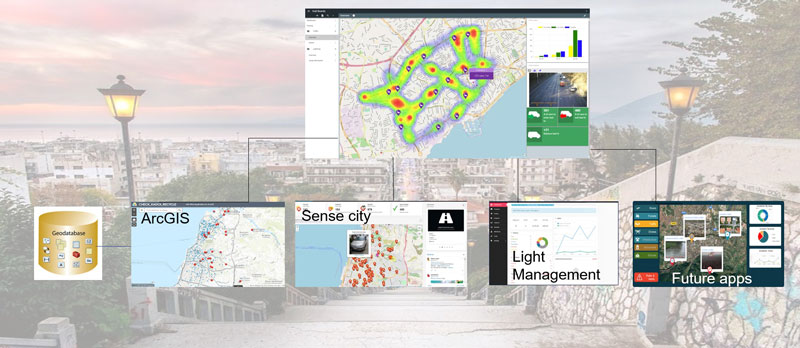by Petros Ganos, Athanasios Kalogeras, Tanya Politi and Lena Tsipouri
Owing to limited human and financial resources, some medium-sized cities, particularly those that are less technologically advanced and with poor administration, risk falling behind their more advanced metropolitan counterparts in the transition into smart cities. A systematised approach is needed to help such cities catch up. The EU ICC initiative helped a group of leading thinkers of the city of Patras to organise a roadmap, consult, design and adopt individual projects, sowing the seeds for a later systematic digital transformation.
As cities face unprecedented challenges, clear policies and investments are needed to achieve climate neutrality and resilience in alignment with European Union policy priorities and initiatives [1]. The Intelligent Cities Challenge (ICC) is an initiative that supports 136 cities in using cutting-edge technologies to lead an intelligent, green, and socially responsible recovery [L1].
Patras, a medium-sized city in South-Western Greece with limited resources due to both the financial crisis and the rigid national regulation for municipalities, benefitted from the interaction and support provided by the predecessor of the ICC. Patras’s involvement in the initiative led to the formation of an encompassing Steering Committee and the creation of an open platform project repository [L2] ensuring transparency and potential synergies. This has allowed the creation of a common city-wide vision and an agreed roadmap that promotes intra-city cooperation but also proves that the selected projects are mature, widespread, and merit being funded by the regional and national authorities. The major lesson learned is that even in difficult situations a small number of volunteers can make a difference if an appropriate frame is offered. The four most recent endeavours in this context are illustrated below.
Interoperability centre of the municipality of Patras
At the municipality level there exist independent digital systems and applications in different formats that focus on the minimum strategy for exporting and interpretation of results and correlation with each other to generate new data. The solution is the creation of an interoperability centre for integration, control and monitoring of smart infrastructure and services of the municipality of Patras. It should function as a single dashboard for monitoring applications’ performance by interconnecting the different subsystems and providing a supervisory management and decision support tool (Figure 1). Integration of systems with the appropriate radial structure reduces the total management cost without falling behind in terms of efficiency. The motivation of interoperability beyond digitalisation and smart applications is mainly the strengthening of decisions at a local level, the improved reliability and the possibilities of flexibility in the adoption of technology with a positive impact on the daily life of citizens.

Figure 1: Interoperability centre of the City of Patras.
Open data platform of the municipality of Patras
The City of Patras comprises a rich digital ecosystem with many researchers and entrepreneurs being very active in the area of data acquisition, data transmission and analysis in different application areas. Through ICC, the City of Patras attempts to consolidate these disperse activities and create a momentum through integrating and providing access to this data while facilitating innovation capacity building for all interested parties. In this respect, one of the specific solutions is an open data platform, which will integrate existing platforms with existing data, accelerate access to newly created sets and enhance usability and visualisation of data as well as the creation of innovative applications. A team of experts has already been assembled to describe functional and non-functional requirements, while the roadmap with emphasis to sustainability has been set.
Upskilling–reskilling
The vision of Patras to become a smart digital city mandates digital upskilling and reskilling of the entire quadruple helix ecosystem, so that it can participate in the digital transformation and exploit new opportunities. To this end, a target under ICC is the establishment of an upskilling–reskilling academy that will diffuse the technological assets of the region, including academic expertise and experimentation over existing digital infrastructure deployments, enhancing overall digital operational maturity. Appropriate curricula will be established capitalising on existing training and capacity building services of the academic world as well as business and business representative organisations in the area. The resulting skills framework will offer vertical learning paths related to areas such as artificial intelligence and cybersecurity, while engaging in horizontal skills training in such fields as digitalisation, green procurement, circularity, and a green deal.
Circularity in the urban area of Patras
The Municipality of Patras has set a local waste management plan (LWMP) with the main aim of enhancing recycling at its origin. The main objectives of the LWMP are: increasing reuse and recycling, reducing disposal of waste to the landfill, reducing transport and waste management costs, utilising smart applications and raising public awareness. One of its priorities is the creation of a “green point network” that contributes significantly to solving the present problem of the ineffective collection of specific recyclable materials. In particular, it will increase the reuse and recycling of certain categories of waste, such as metal, plastic, paper, glass, fabric, wood and packaging waste, resulting in lower volumes of waste ending up in landfill. The ubiquity of digital infrastructures and extended deployments of smart devices and Internet of Things can be an enabler for smart applications and active citizen participation, helping to “break the silos” among application domains and enhance circularity. The main outcome is the monitoring of the waste collection system and increased public awareness of waste management through collection of separate streams of recyclable materials.
Links:
[L1] https://www.intelligentcitieschallenge.eu/
[L2] https://isi.gr
Reference:
[1] D. Eleftheriadou, E. Hartog, N. Gkiaouri: “The Cities Challenge: Driving a Green and Digital Recovery and Social Resilience”, Computer 54.5 (2021): 70-75.
Please contact:
Athanasios Kalogeras
Industrial Systems Institute, ATHENA Research Center, Greece











